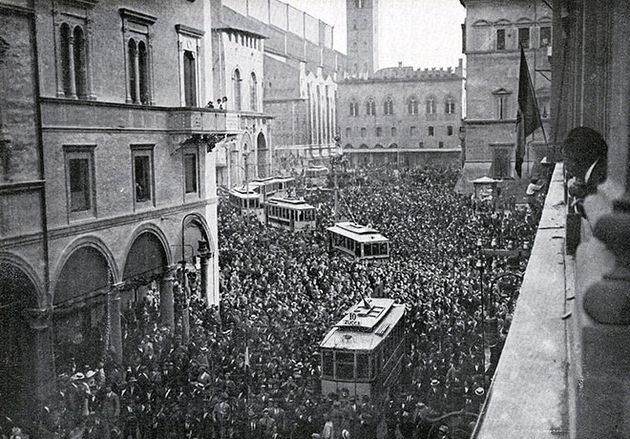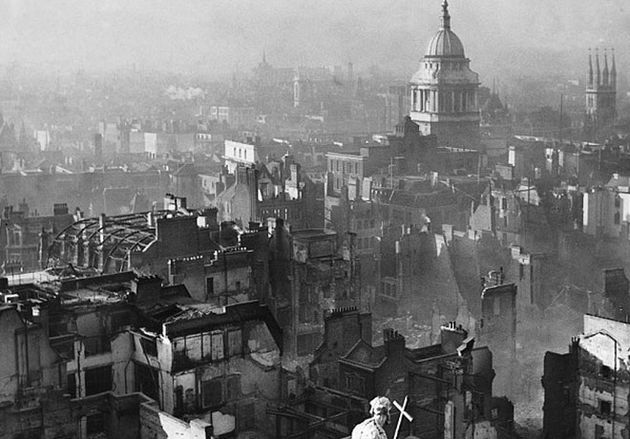Imagining a post-virus landscape and its effects on missions. By R. McLeod and D. Taylor.
![Image via [link]Lausanne Movement[/link].](https://cms.evangelicalfocus.com/upload/imagenes/5f6dfc322bda8_historicparallels.jpg) Image via [link]Lausanne Movement[/link].
Image via [link]Lausanne Movement[/link].
The virus is an extraordinary event, but if we can find an anchor in historical events, it can help us put where we are in some sort of context. The 1918 Spanish flu has epidemiological parallels but is not useful for a broader outlook.
The events of the 1914-45 period which encompassed two world wars do hold some lessons, certainly for Anglo-American societies where that period is part of popular memory.
August 1914 was a shock comparable to the one we are living through; and the dynamic reforms to the economy and society that started in 1945 give us guidance to how the virus might shape society once the pandemic is over.
It is obvious that it is early days yet, and the impact of the virus depends on how long its disruption lasts.
The parallels between COVID-19 and the coming of war in 1914 are strong. Both came at the end of a period of strong global economic growth and globalization. Both events were unexpected, with many regarding the pre-existing globalized world as normal, certain, and permanent.
In both cases the people most economically affected have been the younger generation, of working age with children to support, and those least affected were the old who live on pensions and savings and have larger properties in which to stay at home.
Actions taken by governments parallel those taken in 1914. We have seen a massive increase in debt, unmatched by taxation, to support the economy. Governments are taking control of industries, and civil liberties have been curtailed.
However, the most striking parallel is this: in both cases the impact of the dire event was seen as temporary and reversible. In 1914 the consensus was that the war would last only a few months.
In 2020 the popular consensus is still that a return to BC (before COVID-19) is likely despite the studies showing that suppression of the virus without a vaccine will simply lead to its resurgence.

[photo_footer] Image via Lausanne Movement. [/photo_footer]
The exhausted world of 1945 was able to craft a remarkable range of social and economic measures (we can summarize them as ‘social democracy’) that led to a stunning half-century of prosperity and health.
Let us take just one example where we might see a ‘1945 moment’: climate change. We must beware of those who simply add COVID-19 to their list of reasons why something can and should be done to decarbonize the planet.
However, we also need scepticism towards people who tell us why the virus makes action trickier.
Arguments like this ignore the fact that the virus has changed politics. In 1945, governments committed to a fairer society with health care and full employment despite the fact that economies had been run down by the war effort, foreign investments had been liquidated, and there were millions of displaced people.
On the face of it this should have indicated caution. However, two facts stood out: first, governments had shown they could force through big changes; and second, ordinary people needed and wanted to be rewarded for their sacrifices. The same will be true at the end of the virus emergency.
Climate change is of greater concern to young people simply because they are more likely to live through the damaging consequences. These same people are the ones who are suffering most because of the lockdowns: many have insecure jobs, few savings, are living in limited spaces.
The young disproportionately work in areas of the economy that have been shut down and that will struggle to prosper again, such as the hospitality industry.
After the pandemic, they will resent being asked to shoulder a higher tax burden to pay for the costs of the economic rescue—another aspect of the ‘inter-generational justice’ issue.They are also the least at risk from COVID-19.
They can argue that their lives are disrupted to save old people many of whom would die soon anyway. They can say: ‘How come we can shut down the economy to save a few oldsters, but not to save the planet . . .?’ What will the church have to say about this issue and to these young people? 1
The ‘post-virus world’ does not mean a world free of the virus due to a vaccine, because it will take a long time to develop and deploy one. It may be of limited effectiveness, and it may never come. It means a world that has experienced the virus and that has been changed by it.

[photo_footer] Image via Lausanne Movement. [/photo_footer]
This is not a complete list but is designed to start us thinking about what might change and the implications of those changes:
Christian ministries
They may in many cases emerge in a reduced form, financially damaged by the shutting down of large gatherings and other income-generating events, as well as normal Sunday worship in person, and the impoverishment of some supporters through a COVID-19 and post-COVID-19 economic slump.
The shape of the evangelical landscape may be significantly different in other ways, not least the absence of major gatherings that involve long-distance travel.
On the other hand, many people have been jerked out of their materialistic, self-absorbed lifestyles, and there is a widespread hunger to understand what has happened and why. There is great scope for a revival of faith. How will the church respond to this opportunity?
The response of some established hierarchies (Anglican, Catholic, etc.) in closing churches seems to have sent a negative message to Christians and non-believers alike. On the other hand, there has been an explosion in online worship, evangelism, and discipleship, especially through fora like Zoom.
Some seekers who have joined these online events would not have been prepared to walk through the door of a church. How can these fora be harnessed and directed for Christian worship and evangelism as a permanent feature of the landscape in the future?
Air travel
Cheap air travel led to the mass tourism that spread the virus so quickly. That model looks to have no future as people will be cautious about travel and states will enforce quarantines. Ending mass air travel will also help decarbonization.
The resulting higher fares have huge implications for those used to travelling either for work (such as Lausanne gatherings) or holiday on cheap flights.
Those countries that rely heavily on tourism could suffer massive, permanent damage. Remote island states that do so could suffer complete collapse.
There are also implications for world ‘one state-one vote’ bodies like the UN when a large number of small states that are suffering may sell their votes even more openly (probably to China) than they do now. This has implications for human rights enforcement.
Offices vs. working at home
Human contact will be increasingly online. Working patterns will never be the same again. This will reduce commuting. City centres may have to survive by converting offices to shops and apartments.
Those workplaces that remain will be redesigned. Global hubs like Dubai and Singapore, and even New York and London, might see their recent growth reversed. 2
China
There is a huge amount of anger globally at the way Beijing has handled the outbreak. With its reputation under attack, an isolated Beijing may regard religious minorities as even more sensitive an issue and crack down even harder. 3
Global supply chains
There are already signs of countries seeking to shorten their supply chains or even bring manufacture of strategic items home. Societies will define key sectors like health and make sure they are self-resourced within the country.
Anti-fragility will replace fragility
The world will move away from focusing on high-probability low-impact events like recessions and technological change towards caring about low probability high-impact events like pandemics and (perhaps) catastrophic climate change.
The inevitability of human progress
This widespread secular perception has been dented by the undermining of many seemingly permanent improvements in the material quality and security of life. This shaking is no doubt what lies behind the extraordinary increase in interest in prayer and attendance at online worship events noted above.
How can this be sustained after some of the insecurities are eased?
Re-evaluation of frontline jobs
These are thus far often performed by underpaid and often undervalued staff. How can we contribute to the debate about a new economic order which somehow reflects the true value of work?
The ‘Western brand’
Will this be damaged by stumbling US/European management of the crisis? What effect will this have on mission?
Community cohesion
Many countries have seen a huge increase in volunteering and general community interaction. Churches and individual Christians have in many cases been at the forefront of this.
The key will be to maintain this, as well as respond to the huge swell in interest in matters of spirituality, after life returns to some version of ‘normal’.
We all need to start imagining a world that will be changed in some important respects.
It is impossible to analyze in any detail at this stage how any of these changes might impact individual Christian ministries. Rather, the above is intended as a stimulus for leaders to start thinking through the implications for them and those they lead.
Writing from Europe in the early days of the pandemic, this piece is inevitably written in a strongly Western context. Nevertheless, questions such as these will present themselves in different forms to leaders in different countries in different timescales, as the virus continues its deadly march.
So, we all need to start imagining a world that will be changed in some important respects. How can Christian leaders organize their thinking about a landscape with important features that will remain largely unknown for a while?
How can they start to make prudent plans to address changed contexts for their own operations, to seize the very real God-given opportunities as well as to mitigate the negative features?
Rory Macleod is Managing Director of Objective Analysis, consulting on macro-economic analysis, conduct of monetary policy, debt management and bond market developments. He has an MA and PhD from Oxford University and has worked at a senior level for Baring Asset Management, a Gulf central bank and others.
David Taylor was editor of Lausanne Global Analysis from its launch until earlier this year and is now a member of its Editorial Advisory Board. A former British diplomat and international affairs analyst, he now chairs CSW, a religious freedom advocacy NGO, and serves other Christian ministries as a board member.
This article originally appeared in the September 2020 issue of the Lausanne Global Analysis and is published here with permission. To receive this free bimonthly publication from the Lausanne Movement, subscribe online at www.lausanne.org/analysis.
1. Editor’s note: See article by Ed Brown, entitled ‘Climate Change after Paris’, in May 2016 issue of Lausanne Global Analysis https://www.lausanne.org/content/lga/2016-05/climate-change-after-paris See also article by Mick Pope, entitled ‘Climate Change in Oceania’, in March 2014 issue of Lausanne Global Analysis https://www.lausanne.org/content/lga/2014-03/climate-change-in-oceania-ecomission-and-ecojustice
2. Editor’s note: See article by David Hackett and Michael Kaspar, entitled ‘Virtual Meetings and the Great Commission’, in July 2019 issue of Lausanne Global Analysis https://www.lausanne.org/content/lga/2019-07/virtual-meetings-great-commission
3.Editor’s note: See article by Thomas Harvey, entitled ‘The Uncertain Future of China’s Urban Churches’, in May 2020 issue of Lausanne Global Analysis https://www.lausanne.org/content/lga/2020-05/the-uncertain-future-of-chinas-urban-churches

Las opiniones vertidas por nuestros colaboradores se realizan a nivel personal, pudiendo coincidir o no con la postura de la dirección de Protestante Digital.
Si quieres comentar o